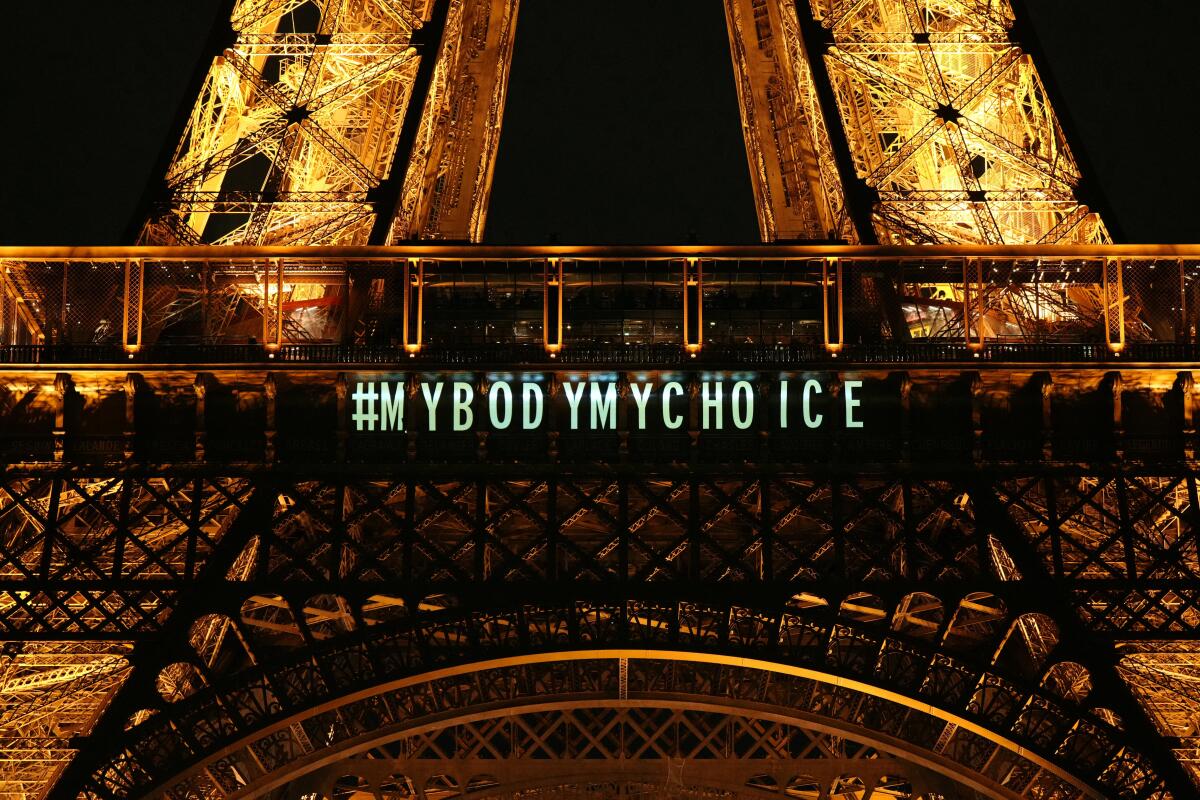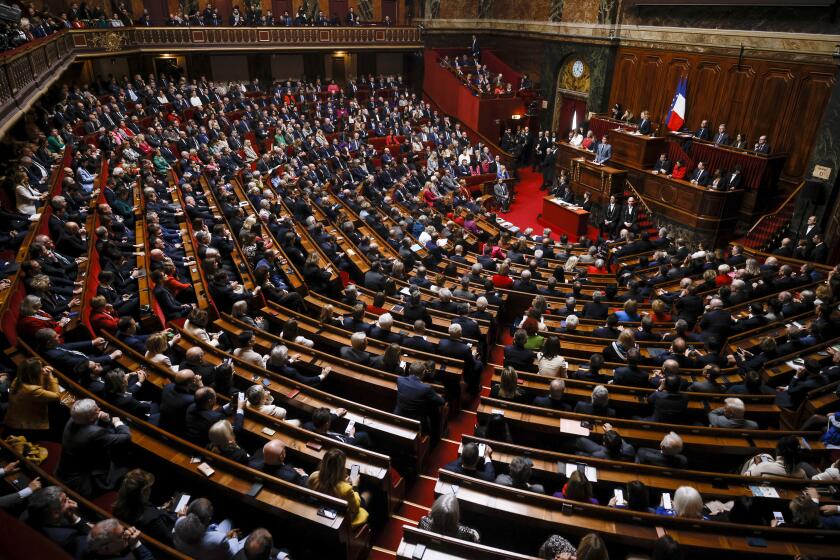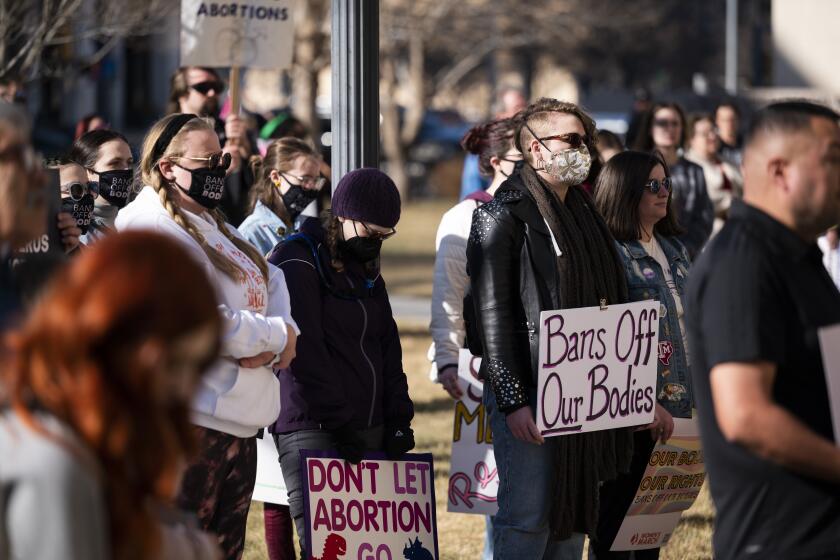Column: Bravo to France for guaranteeing the right to abortion in its constitution — a worldwide first

The ripples of the U.S. Supreme Court’s terrible decision overturning federal protections for abortion have not stopped at our own shores. They have crossed the ocean and resculpted the abortion landscape in countries — well, at least one country — far from our own.
In a momentous decision that was a direct result of the American court’s distressing abandonment of a half century-old right, the French Parliament voted overwhelmingly — 780-72 — on Monday to enshrine the right to abortion in the country’s constitution.
In France, unlike the United States, no woman will ever have to worry about losing the right to control her reproductive fate. C’est un moment magnifique!
The vote, which took place at the Palais de Versailles, was followed by a standing ovation, reported Le Monde, the country’s most influential newspaper. In the evening, the Eiffel Tower lit up with the message — in English, no less — “#MyBodyMyChoice.”
“We are sending the message to all women: Your body belongs to you and no one has the right to control it in your stead,” said Prime Minister Gabriel Attal, 34, who is the country’s first gay prime minister and also its youngest.
Lawmakers approved a bill that will enshrine a woman’s right to an abortion in the French Constitution during a historic joint session of parliament.
This is heartening news at a time when the reproductive rights of Americans are being ripped away in conservative states, and when the Alabama Supreme Court has roiled the country and the fertility industry with its declaration that frozen embryos are children.
“It only takes a moment for everything we thought that we have achieved to fade away,” said Yaël Braun-Pivet, the first female president of the French National Assembly, essentially the equivalent of the American House of Representatives.
Unlike in the U.S., where cultural conservatives have turned the right to abortion into a mostly partisan battle, there was no serious partisan opposition to the amendment, which French President Emmanuel Macron had promised to introduce almost as soon as Roe vs. Wade was overturned in 2022.
Fetal personhood laws and IVF don’t mix. Advanced fertility treatments can’t be squared with the notion that embryos are people.
“Abortion is a fundamental right for all women,” he said at the time. “It must be protected. I express my solidarity with the women whose freedoms are today challenged by the Supreme Court of the United States of America.”
Last week, Macron posted on X, “I am committed to making women’s freedom to have an abortion irreversible by enshrining it in the Constitution.”
Even Macron’s arch-opponent, Marine Le Pen of the far-right National Rally party (formerly the National Front) supported the bill, albeit far less enthusiastically than the president and his allies. On Monday, she downplayed the extraordinary moment: “It serves no purpose, because no political movement is questioning abortion. … There is no need to make this a historic day.”
France is traditionally a Roman Catholic country, but news media cite recent polls showing that more than 90% of its citizens support abortion rights and 86% have been in favor of enshrining them in the constitution.
The forces fighting against legal abortion have already shown their hand: Contraception is the next target.
How ironic that France would be inspired by the United States, not in a positive way, but a negative one. They used to admire how we did things around here.
Nearly two and a half centuries ago, after all, the French modeled a foundational document of their revolution, the 1789 Declaration of the Rights of Man and the Citizen, on our very own 1776 Declaration of Independence.
Two years after our Supreme Court ruled in 1973 that states could impose no restrictions on women seeking abortions in the first trimester of pregnancy, France followed suit.
Gov. Gavin Newsom has unveiled a multistate campaign to combat efforts in Republican-controlled states that ban abortion to block women from traveling for the procedure.
The French legalized abortion in 1975 after the high-profile case of a 16-year-old girl, Marie-Claire Chevalier, who was raped by a classmate and underwent an illegal abortion. She was turned in to police by her rapist, who informed on her to escape prosecution for stealing a car. He was released, while she was arrested and briefly imprisoned before her trial, which ended in acquittal. Her case has been dubbed France’s Roe vs. Wade. Chevalier died of brain cancer in 2022.
Much like Roe, the Chevalier case became a cause célèbre.
At the time, France’s health minister, Simone Veil, who was a survivor of Auschwitz, embraced the movement to legalize abortion, and when the bill was passed, it became known as the Veil Law.
Just before Monday’s vote, Attal invoked her name. “We have a moral debt to women,” he said, according to Le Monde. “We have a chance to change history. Make Simone Veil proud.”
After the French Parliament passed the bill, Macron said his country had sent a “universal message.”
It’s a pity that message will be lost on so many American lawmakers who are determined to turn back the clock on women’s progress rather than advance it.
Today, to paraphrase Prime Minister Attal, America has a moral debt to France.
More to Read
A cure for the common opinion
Get thought-provoking perspectives with our weekly newsletter.
You may occasionally receive promotional content from the Los Angeles Times.
















